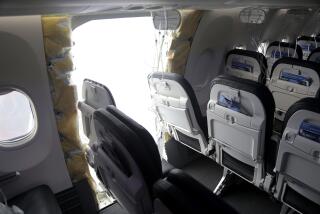Feds investigate whether Honda failed to disclose air-bag problem
The National Highway Transportation Safety Administration has opened an investigation into American Honda Motor Co., asking whether the automaker failed to report known problems with air bags made by Takata Corp. in a timely manner.
Defective Takata air bags, many of them installed in Honda vehicles, have been the subject of NHTSA safety alerts concerning almost 8 million vehicles, after reports of incidents in which the automobile restraint systems exploded and hurled metal shrapnel into the heads and bodies of drivers and passengers.
At least two deaths and many injuries have been associated with the Takata air bags, which were installed in vehicles made by Honda, Toyota, Mazda, Nissan, Mitsubishi, Subaru, Chrysler, Ford and BMW in various model years ranging from 2000 to 2008.
NHTSA posted a report Monday on its website saying it had received information “indicating that [Honda] failed to report incidents involving Takata air bags, which resulted in a death or injury, and for which claims were asserted against Honda.”
Such a failure would be a violation, NHTSA said, of the Transportation Recall Enhancement, Accountability and Documentation Act, a federal law, enacted in 2000, designed to increase consumer protection against dangerous or defective automobiles and auto parts.
The TREAD Act requires that manufacturers issue quarterly reports to NHTSA of any and all claims against them that allege death or injury caused by a possible defect in one of their products.
Failure to do so can result in penalties and fines.
Such penalties resulted in fines of $1.2 billion against Toyota for its failure to properly disclose sudden acceleration problems with its vehicles, and fines of $35 million against General Motors for its delay in answering questions about its ongoing ignition key defect. Both problems were implicated in multiple deaths.
NHTSA also said it was “concerned that Honda’s reporting failures go beyond the Takata incidents,” and that the agency had “received information from Honda indicating that Honda may have failed to meet its TREAD reporting obligations.”
NHTSA said Honda could face fines of $35 million to $300 million, depending on the results of the investigation.
“Our focus is keeping the American public and their vehicles safe,” said David Friedman, NHTSA deputy administrator. “Honda and the other automakers are legally obligated to report this information to us, and failure to do so will not be tolerated.”
Honda and Takata are co-defendants in two class action lawsuits filed last week, both seeking damages and both claiming that the air-bag manufacturer and automaker knew their products were dangerous but failed to report that information or correct the defect.
Honda representatives did not respond to requests for comment.
UPDATE: Honda representatives said late Monday that the company was cooperating in every way with NHTSA.
“In September, Honda initiated a third party audit of potential inaccuracies in its reporting of the written injury and death claims required by the TREAD Act,” the company said in a statement. “We have informed the NHTSA of this review and will soon share our findings with the agency.”
The NHTSA itself has come under fire, too, from critics who have suggested the agency has been too slow to act in the interests of consumers.
Last month, Senators Richard Blumenthal, D-Conn., and Ed Markey, D-Mass., issued a call to NHTSA, demanding it issue a nationwide recall of all cars suspected of having been sold with faulty air bags.
NHTSA has already issued two rare alerts, telling owners that certain models of vehicles made by Honda and other manufacturers were subject to explosions of their passenger-side air bags.
The first warning was for 4.7 million vehicles, with particular emphasis on cars in hot, humid climates, where the incidents are most frequent. Owners of the affected vehicles were told to see their dealers as soon as possible.
The second warning increased the number of affected vehicles to 7.8 million. It included stronger language encouraging owners of affected vehicles to stop driving their cars until they could be inspected by their dealers. Of the 7.8 million affected cars, about 5 million are Hondas.
Twitter: @misterfleming







